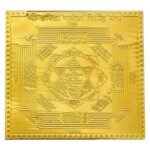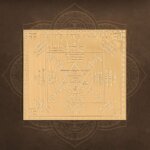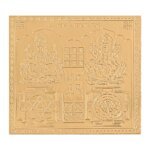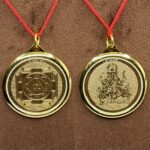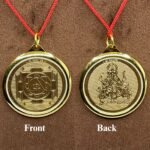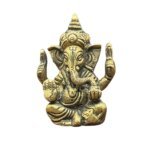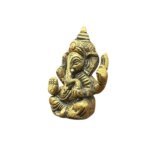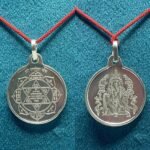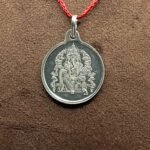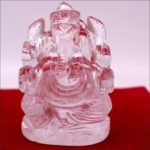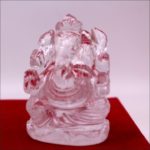Ganesha, the elephant-headed god, is the son of Shiva and Parvati. The many differing accounts of his birth agree in describing it as occurring outside the womb.
In some versions he is created by Shiva alone, and in others, from the bodily fluids of Shiva andParvati mingling outside the body; but in most versions, such as that extracted here, he is created by Parvati alone.
A folk etymology of one of his names, Vinayaka (without a nayaka or leader, that is, peerless), relates it to his origin, that is, he is created without a male agent (nayaka). Parvati creates rather than produces him. She fashions him as the jewish Yahweh creates man out of clay. Her creative role is distinct from the common view of woman as merely a receptacle for the creative male seed.
She rubs Ganesha out of her body-this recalls the churning action that is so creative in Hindu myth-from the Puranic churning of the ocean to the Vedic friction of the two female firesticks which produces the fire god.
In the Shiva Purana , Parvati clearly chooses to create Ganesha to protect her autonomous space from constant invasion by her husband. Her female friends (whose names, Jaya and Vijaya, mean Victory) suggest this act of creation to Parvati; it is while they are bathing with her that Shiva is prevented by Ganesha from entering the bath, and they urge Ganesha on to war against Shiva and the other male gods.
Parvati goes on to create female beings parthenogenetically, to aid Ganesha in his defense of her. Although Shiva triumphs by brute force, his triumph is temporary. He and the other gods are terrified by Parvati’ s irresistible power, and Ganesha has to be revived and honored As guardian of the door, a role he plays for Parvati, his image is placed at the entrance of homes and shops.
He is the god of wisdom and learning, often represented reading or writing. He is the scribe of the Mahabharata, which he wrote at Vyasa’ s dictation. He also represents the fusing of animal, human and divine powers, through the fusion of elephant head with human body and divine four arms.
108 Names of Lord Ganesha in Sanskrit
Following are 108 names of Lord Ganesha in Sanskrit with their meaning in English
(1) Om Vinayakayanamaha – (The blessed one)
(2) Om Vighnarajayanamaha – (The king of obstacles)
(3) Om Gauriputrayanamaha – (The son of Gauri)
(4)Om Ganesvarayanamaha – (the Ishwaraof the Ganas)
(5) Om Skandagrajayanamaha – (the brotherof Skanda)
(6) Om Avyayayanamaha – (the one who is eternal)
(7) Om Putayanamaha – (the one who shimmers)
(8) Om Dakshayanamaha – (the expert)
(9) Om Adhyakshayanamaha – (the one who leads)
(10) Om Dvijapriyayanamaha – (The one who is born twice)
(11) Om Agnigarbhachidenamaha -(He one with fire in his belly)
(12) Om Indrasripradayanamaha – (the one who granted fame and power to Indra)
(13) Om Vanipradayanamaha – (the one who grants voice)
(14) Om PramodayaNamah – (the one who is happy)
(15) (Om Sarvasiddhipradayanamaha – (the one who grants spiritual powers)
(16) Om Sarvajnanayayanamaha – (the one who knows everything)
(17) Om Sarvaripriyayanamaha – (the one who is loved by everyone)
(18) Om Sarvatmakayanamaha – (The one who is present in every soul)
(19) Om Srushtikatrenamaha – (The one who creates)
(20) Om Devayanamaha – (The one who is God)
(21) Om Anekarchitayanamaha – (the one who is present in people’s heart)
(22) Om Sivayanamaha – (the son of Shiva)
(23) Om Suddhayanamaha – (the one who cleanses)
(24) Om Buddhipriyayanamaha – (the one who appreciates wisdom and knowledge)
(25) Om Santayanamaha – (the one who is like a saint)
(26)Om BrahmacharineNaamaha – (the one who is a Brahmachari)
(27) Om Gajananayanamaha – (the one with the face of an elephant)
(28) Om Dvaimatreyayanamaha – (the one who has two mothers)
(29) Om Munistutyayanamaha – (the one who is hailed by the sages)
(30) Om Bhaktavighnavinasanayanamaha – (the one who removes hurdles from the path of his Bhakta)
(31) Om Ekadantayanamaha – (the one with one tusk)
(32) Om Chaturbahavenamaha – (the one with four hands)
(33) Om Chaturayanamaha – (the one who is the cleverest)
(34) Om Saktisamyutayanamaha – (the one blessed with powers)
(35) Om Lambodarayanamaha – (the one with a huge belly)
(36) Om Surpakarnayanamaha – (the one who has ears like winnows)
(37) Om Harayenamaha – (the son of Hara, Shiva)
(38) Om Brahmaviduttamayanamaha – (the one who knows the Brahma knowledge)
(39) Om Kalayanamaha – (the one who is the keeper of time)
(40) Om Grahapatayenamaha – (the chief of the planets)
(42) Om Kaaminenamaha – (the one who fulfils desires)
(43) Om Somasuryagnilochanayanamaha – (the one who has eyes like the Chandra and the Surya)
(44) Om Pasankusadharayanamaha – (the one who holds the paasaand the kusha)
(45) Om Chandayanamaha – (the fiercest one)
(46) Om Gunatitayanamaha – (the one who has the qualities of the Sun)
(47) Om Niranjanayanamaha – (the pure one)
(48) Om Akalmashayanamaha – (the spotless one)
(49) Om Svayamsiddhayanamaha – (the one who is a Siddhahimself)
(50) Om Siddharchitapadambujayanamaha – (the one whose feet are worshipped by the Siddhars)
(51) Om Bijapuraphalasaktayanamaha – (the one who likes the results of the seeds)
(52) Om Varadayanamaha – (the giver of boons)
(53) Om Sasvatayanamaha – (the eternal one)
(54) Om Krutinenamaha – (the performer)
(55) Om ShripatayeNamah – (the one who is the giver of good fortune)
(56) Om Vitabhayayanamaha – (the one who is fearless)
(57) Om Gadinenamaha – (the one who is the ultimate goal)
(58) Om Chakrinenamaha
(59) Om VishnupriyayaNamah – (the favouriteof Lord Vishnu)
(60) Om Ikshuchapadhritenamaha – (He holds the sugarcane)
(61) Om Sridayanamaha – (the giver of wealth)
(62) Om Ajayanamaha – (the invincible one)
(63) Om Utpalakarayanamaha – (the one who holds the lotus)
(64) Om Sripatayenamaha – (the lord of auspiciousness)
(65) Om Stutiharshitayanamaha – (the one who is pleased by prayers)
(66) Om Kuladribhettrenamaha – (the one who broke the mountain)
(67) Om Jatilayanamaha – (the ascetic)
(68) Om Kalikalmashanasanayanamaha – (the one who destroys the dark age)
(69) Om Chandrachudamanayenamaha – (the one who sports the crescent moon)
(70) Om Kantayanamaha – (the one who is pleasing)
(71) Om Papaharinenamaha – (the one who frees a person of his/her sins)
(72) Om Samahitayanamaha – (the affable one)
(73) Om Asritayanamaha – (the one who protects)
(74) Om Srikarayanamaha – (the doer of good)
(75) Om Saumyayanamaha – (the one who is compassionate)
(76) Om AishwaryakaranayaNamah – (the giver of fame and luxuries)
(77) Om Shantayanamaha – (the peaceful one)
(78) Om Kaivalyasukhadayanamaha – (the one who is the giver of pleasure of liberation)
(79) Om Sachidanandavigrahayanamaha – (the one who is the personification of happiness)
(80) Om Jnaninenamaha – (the epitome of knowledge)
(81) Om Dayayutayanamaha – (the merciful one)
(82) Om Dantayanamaha – (the one with the tusk)
(83) Om Brahmadveshavivarjitayanamaha – (the one who ended enmity with Brahma)
(84) Om Srikanthayanamaha – (the one who is like a glorious light)
(85) Om Vibhudesvarayanamaha – (the one who is divine)
(86) Om Ramarchitayanamaha – (the one who is in the heart of ShriRama)
(87) Om Vidhayenamaha – (the learned one)
(88) Om Nagarajayajnopavitavatenamaha – (the one who wears a snake like a yagnipavita)
(89) Om Sthulakanthayanamaha – (the one who is fat)
(90) Om Svayamkartrenamaha – (the self born)
(91) Om Samaghoshapriyayanamaha – (the one who sings the SamaVeda)
(92) Om Parasmainamaha – (the one who is beyond everything)
(93) Om Sthulatundayanamaha – (the one with a big tusk)
(94) Om Agranyenamaha – (the first one)
(95) Om Dhirayanamaha – (the bravest)
(96) Om Vagisayanamaha – (the God of words)
(97) Om Siddhidayakayanamaha – (the one who gives spiritual awakening)
(98) Om Durvabilvapriyayanamaha – (the one who loves the durvaand vilva)
(99) Om Avyaktamurtayenamaha – (the unmanifestedone)
(100) Om Adbhutamurtimatenamaha – (the one with a wonderful form)
(101) Om SumukhayaNamah – (the one with auspicious face)
(102) Om Samastajagadadharayainamaha – (the one who carries the universe)
(103) Om Mayinenamaha – (the one who has an illusionary form)
(104) Om Mushikavahanayanamaha – (the one who rides on the mouse)
(105) Om ParvatinandanayaNamah – (the son of Mata Parvati)
(106) Om Tushtayanamaha – (the one who is always satisfied)
(107) Om Prasannatmanenamaha – (the one who has a pleasant attitude)
(108) Om PramukhayaNamah – (the supreme lord)
(109) Om MahaganapatayeNamah – (the greatest of all)
Ganesha Yantras & Idols
₹319 – ₹2,459Price range: ₹319 through ₹2,459
This product has multiple variants. The options may be chosen on the product page
₹350 – ₹2,710Price range: ₹350 through ₹2,710
This product has multiple variants. The options may be chosen on the product page
₹350 – ₹2,710Price range: ₹350 through ₹2,710
This product has multiple variants. The options may be chosen on the product page
₹800 Original price was: ₹800.₹400Current price is: ₹400.
Select options
₹770 Original price was: ₹770.₹550Current price is: ₹550.
Select options
₹935 Original price was: ₹935.₹651Current price is: ₹651.
Select options
₹4,500 Original price was: ₹4,500.₹3,750Current price is: ₹3,750.
Select options
₹8,600 Original price was: ₹8,600.₹6,006Current price is: ₹6,006.
Select options
₹7,810 Original price was: ₹7,810.₹6,110Current price is: ₹6,110.
Select options
₹6,500 – ₹8,100Price range: ₹6,500 through ₹8,100
This product has multiple variants. The options may be chosen on the product page
₹8,300 Original price was: ₹8,300.₹7,300Current price is: ₹7,300.
Select options


